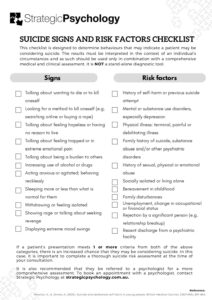
SUICIDE-SIGNS-AND-RISK-FACTORS-CHECKLIST
468 KB
This checklist is designed to determine behaviours that may indicate a patient may be considering suicide. The results must be interpreted in the context of an individual’s circumstances and as such should be used only in combination with a comprehensive medical and clinical assessment. It is NOT a stand-alone diagnostic tool.
Signs
Talking about wanting to die or to kill oneself
Looking for a method to kill oneself (e.g. searching online or buying a rope)
Talking about feeling hopeless or having no reason to live
Talking about feeling trapped or in extreme emotional pain
Talking about being a burden to others
Increasing use of alcohol or drugs
Acting anxious or agitated; behaving recklessly
Sleeping more or less than what is normal for them
Withdrawing or feeling isolated
Showing rage or talking about seeking revenge
Displaying extreme mood swings
Risk factors
History of self-harm or previous suicide attempt
Mental or substance use disorders, especially depression
Physical illness: terminal, painful or debilitating illness
Family history of suicide, substance abuse and/or other psychiatric disorders
History of sexual, physical or emotional abuse
Socially isolated or living alone
Bereavement in childhood
Family disturbances
Unemployment, change in occupational or financial status
Rejection by a significant person (e.g. relationship breakup)
Recent discharge from a psychiatric facility
If a patient’s presentation meets 1 or more criteria from both of the above categories, there is an increased chance that they may be considering suicide. In this case, it is important to complete a thorough suicide risk assessment at the time of your consultation.
It is also recommended that they be referred to a psychologist for a more comprehensive assessment. To book an appointment with a psychologist, contact Strategic Psychology on (02) 6262 6157 or email support@strategicpsychology.com.au.
Reference: American Psychiatric Association. (2013). Diagnostic and statistical manual of mental disorders (DSM-5). Washington, D.C.: American Psychiatric Association.
